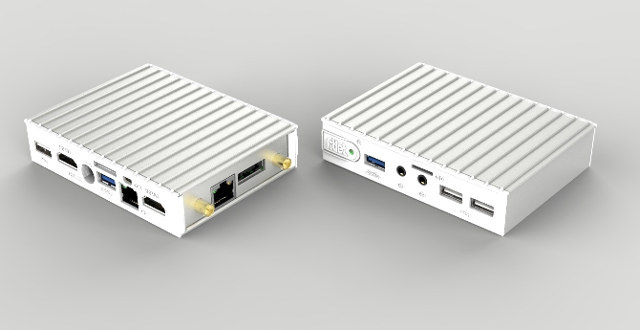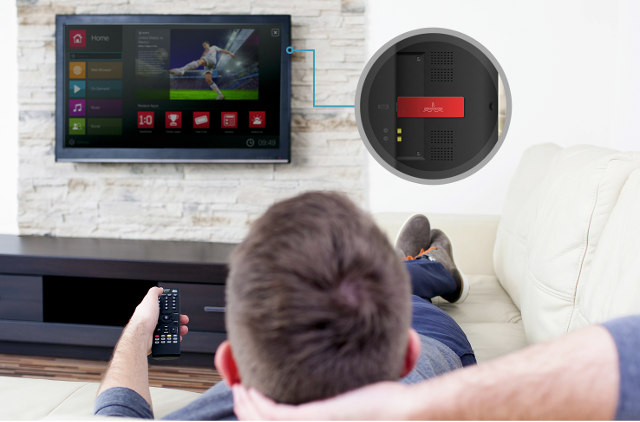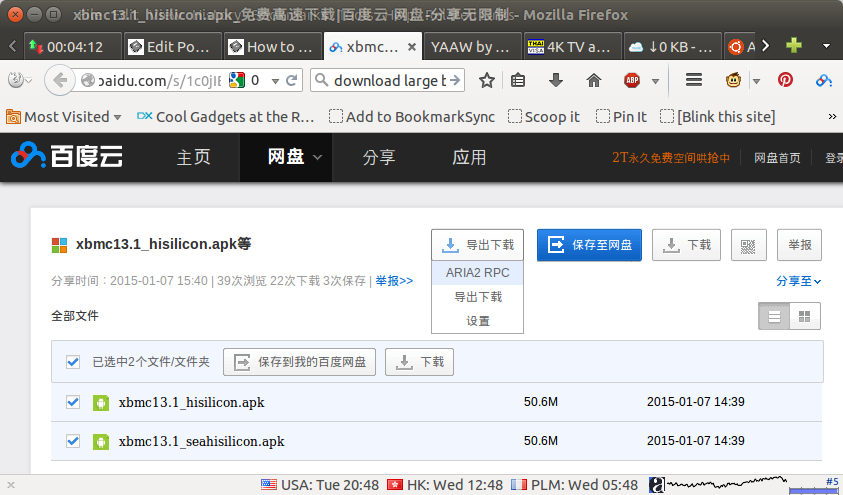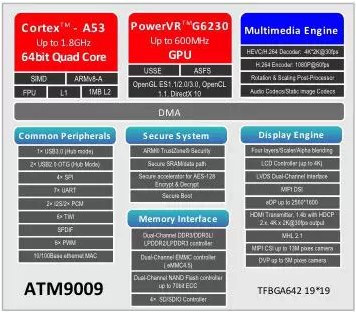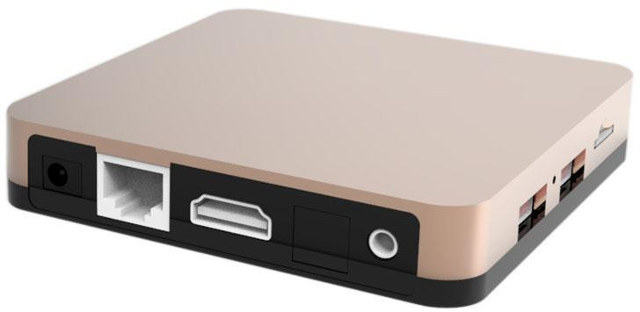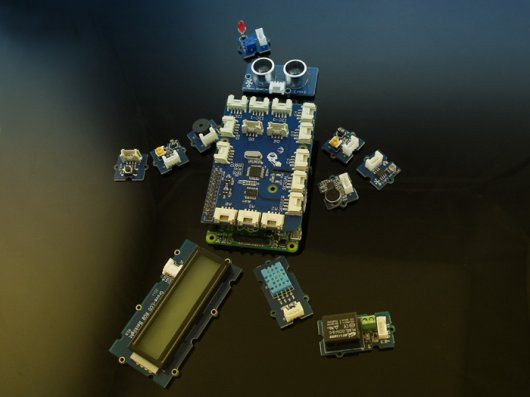Tizen operating system is already found in cameras, and smartwatches, with works also being done for televisions, laptops and cars, but the Tizen smartphone has been mostly newsworthy because of product cancellations or delays, rather than product launches. But finally, the first Tizen smartphone has been introduced in India, it’s called Samsung Z1 and sells for 5,700 Indian Rupees ($92). Samsung Z1 (SM-Z130H/DS) specifications: Processor – Spreadtrum SC7727S dual core Cortex A7 processor @ 1.2 GHz with Mali-400 GPU System Memory – 768 MB RAM Storage – 4GB Internal memory + micro SD slot (up to 64GB) Display – 4” WVGA (800×480) PLS screen Cellular Connectivity – GSM 850/900/1800/1900 MHz, HSDPA 900/2100 MHz. Dual SIM support. Connectivity – WiFi 802.11 b/g/n, Bluetooth 4.1, GPS Video – MP4, M4V, 3GP, ASF, AVI, FLV, MKV Audio – MP3, M4A, 3GA, AAC, OGG, OGA, WAV, AMR, AWB, FLAC Camera – 3.1MP rear camera, VGA […]
AMD Mullins Powered Compulab Fitlet mini PCs Run Linux Mint or Windows
Finally an alternative to the recent wave of Intel Bay Trail-T mini PCs and sticks thanks to Compulab Fitlet mini PCs powered by AMD Mullins APUs, namely AMD A4 Micro-6400T and E1 Micro-6200T, with Radeon graphics, supporting up to 8GB RAM, mSATA, up to two HDMI port, up to four Gigabit Ethernet ports, and more. There are three Fitlet models: Fitlet-i, Fitlet-X with four Gigabit Ethernet port, and Fitlet-B, the entry-level option. In Q2 2015, a MintBox mini model running Linux Mint will also be released. Fitlet-i specifications: SoC – AMD A4 Micro-6400T 64 bit quad-core processor up to 1.6 GHz with Radeon R3 Graphics (4.5W TDP) System Memory – Up to 8 GB DDR3-1333 (1x SODIMM) Storage – mSATA up to 1 TB (SATA 3.0), power eSATA (5V), and micro-SD slot (SDXC support, rate 25 MB/s) Video Output – Dual HDMI 1.4a up to 1920×1200@60Hz Audio I/O – HDMI, S/PDIF […]
Broadcom Unveils BCM725x SoCs for STBs and TV Sticks
Broadcom has recently announced two new SoCs, namely BCM7250 and BCM72502, respectively targeted at OTT streaming media player form factor and HDMI stick or dongle applications. Both feature Broadcom’s Brahma-B15 ARMv7-A cores, support 10-bit H.265, HDMI 2.0, MHL 2.0, and up to to 4×4 5G WiFi via BCM4366 WiSoC. Key features listed by Broadcom for both SoCs: High Efficiency Video Coding (HEVC)/H.265 compression 6000 DMIPS B15 ARMv7-A CPU 1.0 Gpix/s OpenGL ES 3.0 3D GPU Supports HDMI 2.0 with HDCP 2.2 or MHL 2.0 digital video output PCIe connectivity to Broadcom BCM4366 4×4 carrier-grade 5G WiFi 480/576p30 transcode 1080p60 10-Bit HD HEVC decode and 4Kp60 upscale High Performance DDR3/DDR4 system memory interface Supports Android, Chromium, DIAL, DLNA CVP2, Miracast protocols Supports Broadcom Trellis Multi-Application Framework and DTVKit software stack The company can also provide reference platforms with 2×2 and 4×4 5G WiFi connectivity options via a high-speed PCIe interface, and announced […]
Downloading Files on Baidu, or via HTTP, Bittorrent or Metalink in Linux with BaiduExporter, Aria2 and YAAW
Most firmware files distributed by the manufacturers are uploaded to Baidu, but I’ve found the service not to be always reliable, especially for larger files. In Windows, people are recommended to use Baidu software (BaiduYunGuanjia), but there’s not such tool in Linux, so instead I investigate for command lines tools to download files from Baidu, and this lead me to two interesting tools called Aria2, a “lightweight multi-protocol & multi-source command-line download utility. It supports HTTP/HTTPS, FTP, BitTorrent and Metalink”, and YAAW “Yet Another Aria2 Web Frontend” with allow to start and monitor download locally or remotely. But let’s start with the first tool I found: pan-baidu-download, a Python script to download files from Baidu. To install it:
|
1 2 |
git clone https://github.com/banbanchs/pan-baidu-download.git cd pan-baidu-download |
We also need to install some dependencies (assuming python 2.7.x is already installed):
|
1 |
sudo apt-get install python-pip aria2 |
and then you can start downloading files as follows:
|
1 |
python bddown_cli.py download http://pan.baidu.com/s/somerandomcharacters |
But after posting a bug about password-protected […]
Actions Semi Introduces Quad Core 64-bit ATM9009 Processor for Tablets and TV Boxes
2015 will clearly be the year of 64-bit ARM processors, and one more company has now announced yet another ARMv8 SoC. Action Semi ATM9009 features four Cortex A53 cores coupled with an Imagination Technologies PowerVR GPU and targets entry-level and mid-range tablets and TV boxes, and certainly not high-end products as per the press release. The key features of ATM9009 include: Processor – Quad core Cortex A53 processor to 1.8 GHz GPU – PowerVR G6230 up to 600 MHz with support for OpenGL ES 1.1/2.0/3.0, OpenCL 1.1, and DirectX 10 Memory I/F – eMMC 4.5, NAND flash controller, 4x SD/SDIO controller, DDR3/DDR3L and LPDDR2/LPDDR1 (Up to 8GB RAM) Video – HEVC/H.265 video decoding up to 30 fps, H.265 encoder up to 1080p60 Display / Video Ouptut – LCD controller up to 4K, HDMI 1.4, MHL 2.1, dual channel LVDS , MIPI DSI, eDP up to 2560×1600 Camera I/F – MIPI […]
How to Upgrade Firmware in HiSilicon Hi3798M TV Boxes
HiSilicon based Android TV boxes are not that popular, at least outside of China, but I’ve got one with BFS 4KH featuring HiSilicon Hi3798M processor, and since we could not fix AC3 audio decoding after a factory reset in the firmware I have, the company provided me with a new firmware, and I’ll document the procedure I followed below. Download the firmware, the file should be update.zip. For BFS 4KH, I could get it @ http://pan.baidu.com/s/1kTrCcMr (password: xpef). It includes YouTube and Google Play, but not the Rainbow launcher, nor XBMC, but these can be side-loaded. Now copy update.zip on the root of a USB flash drive formatted with FAT32, and at least 1GB free storage. Connect the USB flash to the USB 2.0 port of the device, as the USB 3.0 port can’t be used for firmware upgrade. In the current firmware, go to Settings->System->Local Update, and select the […]
Allwinner H3 Android TV Boxes Are Now Selling
Allwinner H3 SoC was announced last month, promoted as a quad core processor for low cost ($35 to $50) media players with HEC/H.265 codec support up to 2160p. At least one box – model TVPP0030 – has shown up on Aliexpress for $83.79 including shipping, so either the price initially announced was the BoM cost, or the first sellers offer the box at a premium. TVPP0030 specifications: SoC – Allwinner H3 quad core ARM Cortex A7 @ 1.5GHz with quad core Mali-400MP2 System Memory – 1 GB DDR3 Storage – 8 GB NAND flash + micro SD slot up to 32GB Connectivity – 10/100M Ethernet, 802.11 b/g/n Wi-Fi, and Bluetooth Video Output – HDMI 1.3? up to 4K2K, AV output Audio Output – HDMI, AV, optical S/PDIF USB – 2x USB 2.0 ports Misc – IR sensor, recovery pinhole Power Supply – 5V/2A Dimensions – N/A Weight – N/A The […]
GrovePi+ Starter Kit Adds Multiple Sensors, Relays, an LCD, a Buzzer… to the Raspberry Pi Boards
Seeed Studio and Dexter Industries has introduced the GrovePi+ Starter Kit for the Raspberry Pi (All models) that includes the GrovePi+ board, and various Grove modules adding sensors, buttons, a buzzer, LEDs and more. GrovePi+ board connects to the GPIO header of the Raspberry Pi, and features several Grove connectors to interface with Groves modules part of the starter kit Grove Light Sensor Module Grove Sound Sensor Module Grove Temperature and Humidity Sensor Module (not the ‘PRO’ version) Grove Button Module Grove Rotary Angle Sensor Module Grove Buzzer Module Grove Relay Module 3x Grove LED Modules (One Red, Green, and Blue LEDS, all replaceable with user LED) Grove Ultrasonic Sensor Module Grove LCD RGB Backlight Module Grove cables, and a GrovePi+ guidebook are also included. The GrovePi+ board is an Arduino compatible board featuring ATMEGA328 microcontroller, and can be programmed with C/C++, Python, and experimental Go and node.js coding is […]



